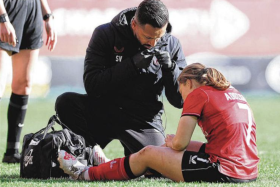Public health personnel to defer all travel and leave
Their travel and leave have been deferred and contingency plans are in motion, says chairman of GPC for Health
All personal and professional travel, as well as leave, has been deferred indefinitely for public healthcare personnel, as the coronavirus outbreak continues to grip the international community.
Singapore's public healthcare personnel are currently on high alert, and contingency plans have been set in motion since the lockdown of all travel in and out of Wuhan that was instituted by the Chinese authorities late last month.
Speaking to The New Paper yesterday, Dr Chia Shi-Lu, chairman of the Government Parliamentary Committee for Health, said that the protocol, designed to deal with the threat of infectious diseases, is in place not because of a manpower shortage, but to ensure that Singapore's healthcare sector is ready for deployment should the situation arise.
He explained that the public healthcare sector will split into four or five self-contained teams, so that even if members become exposed to the virus, the other teams can continue the fight.
He said: "During the Sars (severe acute respiratory syndrome) period, for example, we split up into three teams, so each team will work for two weeks, and then rest for four.
"But because one member of a team was exposed to the virus, all personnel in that team had to be isolated, (and) the remaining two teams then had to step in and work additional weeks."
Luckily, the epidemic ceased soon after, otherwise the remaining two teams would have been overworked, he said.
Dr Chia said that learning from the Sars experience, the system has since made sure that more teams are available.
"This is why we need to ensure that doctors and nurses are available, and not on leave or abroad. This system requires careful rostering - the plan works only if there are enough people," he said.
Should there be reason for it, personnel can still appeal for leave to be granted, he added.
Dr Chia pointed out that such contingencies are the norm for doctors, especially those who have experience in the public healthcare system, which needs to stay ahead of the situation.
"Healthcare personnel are at the front line and are at risk. (Such outbreaks) affect healthcare workers disproportionately, and if the healthcare system is down, national confidence will take a hit," Dr Chia said, adding that such contingencies have been taken before, including in reaction to Mers and the swine flu.
In his ministerial statement in Parliament yesterday, Health Minister Gan Kim Yong said healthcare providers play a key role in the detection and isolation of suspected and confirmed cases.
He said: "Our front-line doctors - polyclinics, GPs and emergency department doctors - are on high alert for persons with travel history and respiratory symptoms such as fever and cough."
"I would like to extend my sincere appreciation to all our healthcare workers and their families. They have worked tirelessly over the past few weeks, missing their holidays or reunion dinners. They put themselves in harm's way so as to keep Singapore safe," Mr Gan added.
Dr Chia said that healthcare workers are on standby and ready to slip into protocol whenever necessary.
"In case (the outbreak) escalates, we will need the manpower. Hopefully we won't get to that point, but as healthcare professionals, we are not here to hope for the best, but to make sure we are ready for the worst," he said.
Get The New Paper on your phone with the free TNP app. Download from the Apple App Store or Google Play Store now



